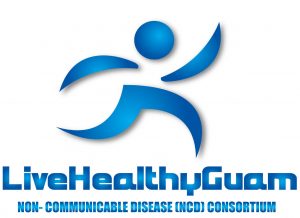Non-communicable Disease Control Program
ALARMING RISE IN NUMBERS OF NON-COMMUNICABLE DISEASES
Guam has seen an epidemic of Non-Communicable Diseases (NCD) such as heart disease, stroke, cancer, and diabetes. The burden of these diseases, including their associated risk factors, has affected each and every family in the U.S. Territory of Guam. This has an impact on not only the health, but most importantly, the financial resources of the individual and community. These NCDs are preventable by adopting a healthier lifestyle through proper nutrition, increased physical activity, and prevention of risk behaviors such as alcohol, tobacco, and drug use.
In May 2010, the Pacific Island Health Officers Association (PIHOA) declared a regional state of health emergency in the six U.S. Affiliated Pacific islands (USAPIs) due to the epidemic of non-communicable diseases in the region. The USAPI is made up of Guam, the Commonwealth of Northern Mariana Islands, the Federated States of Micronesia, the Republic of Palau, the Republic of the Marshall Islands, and American Samoa. According to PIHOA the USAPIs have some of the highest rates of NCDs in the world. According to the World Health Organization (WHO), the Western Pacific region represents 37% of diabetes cases in the world. Diabetes, heart diseases, strokes, cancer, and other NCDs are the cause of mortality among the people of the Pacific, placing a significant burden on their daily functionality, and threatening the national security of these island countries and territories. NCDs impair workers’ productivity, increase absenteeism from the workplace, cause untold suffering to patients and their families, and lead to increased health care costs, including expenses for off-island medical referrals. Diabetes is the leading cause of blindness, amputations, and end-stage renal disease.
A collaborate effort was needed to combat and address the burden NCDs placed on families and communities. The NCD Consortium, a group made up of representatives from various government agencies, not-for-profit organizations and the private sector, answered the call to action in response to the NCD epidemic. The Consortium works together to reduce the burden of non-communicable diseases such as heart disease, stroke/CVA, cancer, diabetes, asthma, etc. The program addresses smoking, nutrition, alcohol, physical activity and obesity. Through their hard work and dedication, the first Guam Non-Communicable Disease Strategic Plan was developed. Three years later, in 2014, the NCD Consortium developed the second Non-Communicable Disease Strategic Plan.
AW
